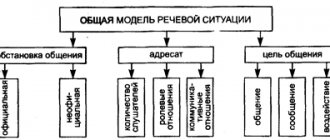Mental phenomenon Interested in Is initiative punishable?
What appears outwardly as interest can be of a very different nature. Conventionally, we can subdivide pre-reflex, reflex and conscious externally observable signs of interest. Each of these levels has its own qualitatively different implementation mechanism. What they all have in common is that all of these are manifestations of the body’s adaptability: reactions that increase adaptability to new conditions. And therefore, it is especially significant to trace how the reactions of individual adaptation became more complex in the course of evolutionary improvement.
Psychology usually considers interest as a manifestation of the operation of a “black box”, i.e. without defining a specific mechanism, which leads to many uncertainties and inadequacies of the actual organization. Thus, interest is often attributed to emotions. But emotion manifests itself subjectively as a conscious style of behavior. Before awareness, behavior is characterized by a “searching” style of behavior that precedes the “orienting reflex.”
Search behavior in protozoa exists at an embryonic stage. For example, predatory ciliates are capable of actively searching for prey. Search behavior of animals:
Animal behavior is not always a passive reaction to external stimuli. In many cases, having reached a state of specific readiness for some type of activity (for example, readiness for reproduction), it actively seeks stimuli under the influence of which this activity could be carried out... The search phase ends when the animal reaches a situation in which the next link in this chain of reactions can occur. ... The search phase, like the final act, is built on an innate basis. During ontogenesis, this basis is supplemented by acquired reactions. It is search behavior that is the means of individual adaptation of animals to the environment, and this adaptation is infinitely diverse in its forms.
Here we could draw a fundamental line so as not to call active reactions the dissolution of limestone by acid, and in general all interactions in which we arbitrarily distinguish the active role of something. But in practical terms, this distinction is completely unnecessary. The division into living and nonliving is the lot of philosophers, so we will simply talk about different levels of organization of adaptability to the new, as a result of which the object of our attention turns out to be successful in this or for the observer loses the form of its existence.
Interest is critical to individual adaptability. Interest and its meaning:
The dependence experienced or perceived by a person on what he needs or what he is interested in gives rise to a focus on the corresponding object. In the absence of something for which a person has a need or interest, a person experiences more or less painful tension, anxiety, from which he naturally strives to free himself. From here, at first, a more or less indefinite dynamic tendency arises, which turns into aspiration when the point towards which everything is directed is already somewhat clearly visible. As trends become objectified, i.e. the object to which they are directed is determined, they become increasingly conscious motives of activity, more or less adequately reflecting the objective driving forces of human activity. Since a tendency usually causes activity aimed at satisfying the need or interest that caused it, emerging but inhibited motor moments are usually associated with it, which enhance the dynamic, directed nature of the tendencies.
... In ever-expanding contact with the outside world, a person encounters ever new objects and aspects of reality. When, due to certain circumstances, something acquires some significance for a person, it can arouse interest in him - a specific focus of the personality on it.
... An attempt to reduce interest to a need, defining it exclusively as a conscious need, is untenable. Awareness of a need can arouse interest in an object that can satisfy it, but an unconscious need as such is still a need (transforming into a desire), and not an interest.
Let us call interest the manifestation of the activity of reactions of an object of adaptability in relation to the environment in order to identify new and important
properties for him. Activities of both externally observable and potentially prepared by the internal structures of the object of adaptability. In the case of individuals who have consciousness - subjective activity in relation to the object of their interest. This can make interest and conscious attention synonymous, which has great meaning for adaptability because interest in this case is precisely the maximum of novelty and significance among all other internal activities of the individual. But interest is something more than the current act of attracting attention, because attention can jump from one to another as their relevance changes, and interest is something more long-lived, although caused by one of the acts of activity. In accordance with the model of individual adaptability of the subject, developed on the site, attracting attention means the emergence of a significant problem associated with new conditions in which the previous, habitual significance may be meaningful in a completely different way (conscious arbitrariness). Having arisen, a significant problem can give rise to a long-lived, constantly activated dominant of the unresolved problem, which is tantamount to maintaining interest in it. A large layer of ideas that are necessary for understanding what has been said is available in the articles Fundamentals of Adaptology and, in an easier, popular version of the chapters of the book Know Thyself.
This is approximately how it is possible to correlate the usual associations from the word “interest” and those processes that are determined by the mechanisms of adaptability in the body.
With the change of periods of development in ontogenesis, more and more advanced levels of manifestation of interest arise, repeating in the development of the species, from pre-reflexive to the level of consciousness. The “orienting reflex” turns out to be the boundary of adaptability between the level of consciousness and the previous ones.
The first hereditarily predisposed reactions of exploratory activity in relation to the environment form the primary structures of the brain - in the form of sets of primitives of perception from the outside and action from the other. It is difficult, but we can say that the tracking orientation of the sensory organs embodies the simplest level of manifestation of interest, although for parents observing the child’s reactions this is quite obvious.
Secondary structures are formed in acts of imitation and this period is characterized by the reflex formation of the first skills. This is a period of “trusting learning,” when the most important and basic survival skills acquired by parents are passed on to their children. At this time, subjective images are formed, associated with a certain meaning, which is authoritarianly transmitted from parents and supported by its own system of significance based on recognizers of deviations in homeostasis parameters.
Sufficient maturation of the frontal lobes and the mechanisms for connecting subjective images to them in order to comprehend the most relevant of them characterizes the emergence of a new level - comprehension of what is happening with a subjective arbitrary assignment of meaning. A period of initiative arises in which previously perceived norms of behavior are rethought whenever they turn out to be relevant enough for awareness.
Thus, initiative is a manifestation of an arbitrary level of interest.
Authoritarianism directly conflicts with interest as a manifestation of the period of initiative. In many cases, the child begins to realize that, perhaps, previously perceived behavioral stereotypes do not suit him and attempts are made to act differently. Increased skepticism develops, even to the point of complete denial, about what has been perceived authoritarianly, supported by an exciting sense of the possibility of doing it differently.
This feeling of one's new capabilities is the strongest positive emotional factor, supported by successful attempts. Here, stating the superiority of one’s original behavior is the strongest motivating stimulus for the development of volition and initiative. At the same time, too frequent failures and, especially, authoritarian critical assessment can block the motivation for arbitrariness. Motivation, interests, beliefs:
Subjectively - for the person himself - interests are revealed in the positive emotional tone that the process of cognition acquires, in the desire to become more deeply acquainted with an object that has acquired significance, to learn even more about it, to understand it. … Interests force a person to actively seek ways and means to satisfy his thirst for knowledge and understanding. Satisfying interest in an object of lasting significance, as a rule, does not lead to the extinction of interest, but internally rebuilding, enriching and deepening it, causes the emergence of new interests that correspond to a higher level of cognitive activity.
In the general development of voluntariness for a variety of contexts, conditions and circumstances, they begin to highlight what remains highly motivating interest and what is blocked by failures or does not appear at all in the field of conscious attention. This leads to different directions of personal interests. Predominant interests:
Trying to find answers to these questions, we delve step by step into a certain specific state, in which we simultaneously experience a feeling of some inhibition, abstraction from the place and time of our stay with a high concentration on images recalled from memory, associations that thought tries to organize in search of non-obvious connections between phenomena and our impressions, which we express with the exclamation: “That’s what’s interesting!” This means that it’s interesting when you want to find something, understand something, learn something from what makes up the endless world around us.
One of the factors supporting the development of arbitrariness, helping to find an alternative to what is authoritarianly imposed, is arrogance. And, of course, arrogance introduces a special antagonism between authoritarianism and initiative. Any extreme in this leads to a catastrophic disruption of adaptability at the level of both the individual and society so that the balance is maintained in their confrontation with the correction of the consequences of both excessive authoritarianism and anarchic manifestations of initiative.
The question of the acceptability of an initiative is very context-dependent: for different conditions and circumstances, the balance can be shifted very significantly. This is reflected in the popular phrase: “Initiative is punishable.” In its original form, the phrase looked somewhat different, namely “in the army, initiative is punishable.” The expression appeared among military personnel and meant that any initiative shown by a junior in rank leads to the fact that he will be forced to implement it, and will also bear full responsibility for possible failure. An initiative can meet with resistance both from authoritarianism and conflict of interests of other individuals, and cause an internal deviation from the usual. In all cases, this can be overcome by willpower, i.e. realized arbitrariness of choice, which requires the development of a certain skill from complete lack of will to high self-discipline. The implementation of such arbitrariness depends on many subjectively assessed factors (see Laziness).
The social specificity of the manifestation of personal interest and initiative in the conditions of a specific social culture can be traced using the example of the last historical period of Russia's development.
The period from the 1917 revolution is characterized by extremely high authoritarianism in the imposition of their ideas by the organizers of the revolution, breaking the previous established culture of relationships and forming a new one, in which the main thing was unquestioning submission to the ideals, goals and specific directives of the new doctrine of government. The principle of management was purely voluntaristic and maximally centralized.
In order for someone’s initiative to be accepted and approved, trust in the initiator was necessary, his condition of fanatical loyalty, but even at the same time the initiative was punishable in the sense of the first, military application of this phrase. The hierarchy of power with its centralization leads to the fact that each immediate superior, who turns out to be insufficiently competent in predicting the specifics of an initiative, is forced to trust his subordinate, but at the same time his mistakes are blamed as a complete evil, and not as an inevitable negative result in everything new. Adaptability in this case is functionally lost because their role in assessing the unaccounted factor disappears; they become a more general negative, blocking the desire to take initiative and try something. Even if the mistake could be corrected by taking into account a new factor and doing it more correctly, then after punishment this path becomes dangerous and is avoided.
Although in some particularly important areas the possibility of error is taken into account by the authoritarian authorities, who are ready to make a certain number of mistakes, their competence does not allow them to assess how many errors in this direction are inevitable and a punitive measure of restraint arises from a certain level of tolerance. Not to mention the psychological nuances of relationships, the main thing is that initiative becomes undesirable unless it definitely promises success. The number of initiatives in the development of anything becomes low. As a result, the development of new directions requires extra efforts and increased resources. Otherwise, the style “the best is the enemy of the good” and the corresponding passivity in creativity are established.
Each link of management turns out to be endowed with some authoritarian power, largely irresponsible because the ultimate responsibility falls on the executors (the switchman is to blame). Habitual avoidance of creativity, with the necessary persistence in achieving arbitrariness (arrogance), causes disadaptation of such skills not only individually, but also socially determined. At the same time, the use of voluntaristic power at every level of management turns out to be quite safe for the boss, which provokes many fraudulent actions from theft (everything around is the people’s, everything around is mine) to services for bribes. This becomes an element of the generally accepted culture of imperious irresponsibility so inevitably that all attempts to stop it by the highest authorities turn out to be ineffective.
An example of such a situation is execution for spikelets “Decree on spikelets” and In 1932, the “law on three spikelets” was issued in the USSR:
Perhaps one of the most tragic pages in the history of the Russian peasantry was the time of repression that began after the adoption of the resolution of the Central Executive Committee and the Council of People's Commissars of the USSR on August 7, 1932 “On the protection of the property of state enterprises, collective farms and cooperation and the strengthening of public (socialist) property.”
Despite any repression and threats, the theft of what ends up in the zone of authoritarian power of a given level remains practically ineradicable.
As a result of a strong imbalance in the balance of authoritarianism and initiative, several generations of thieves and passive people arose, even at the lowest level (who also did not refrain from stealing what was in their area of responsibility), and any other style of behavior turned out to be incompatible with this. This, in entire important industries, control over which was lost by the highest planning authority, led to a catastrophic lag compared to countries where there was no such terror in relation to the initiative: radio electronics and its components, circuitry, computer technology, household appliances and products, cars, etc. .d.
In the article Why the USSR never created its own Internet:
The military reacted to the scientists' proposal with a fair amount of skepticism. They were not happy about the possible connection of their networks with economic management, because in this case they would take responsibility for the development of the country. One of the authors of the initiative - Soviet scientist, engineer-colonel Anatoly Titov - later recalled that officials were also afraid of becoming unnecessary if their functions were performed by machines. ... It is interesting that the principle of centralizing the system of transmission, storage and processing of data, which, according to Kharkevich, can only function in a socialist state, was contrary to the words of Norbert Wiener, the founder of cybernetics. He believed that his social theory would not strengthen, but rather destroy the vertical system of control, allowing different segments of the population to freely communicate and exchange opinions. ... Scientists proposed to Kosygin a new plan for automating economic planning - now on the basis of a single network separate from the military, specially created for these purposes. The plan, drawn up after studying the work of almost a hundred government organizations, envisaged the construction of 100-200 large data processing centers in large cities, to which approximately 20 thousand small ones would be connected via high-speed communication lines. ... Glushkov believed that all information should be stored in a central digital structure and retrieved from there almost instantly. Moreover, his system was supposed to manage all processes in the state, right down to automatically creating a daily schedule for each employee. Glushkov’s proposal immediately found opponents, primarily enterprise managers and officials. They believed that the system would take over their functions and weaken government control over information. Liberals saw it as an attempt by conservatives to centralize the economy as opposed to the gradual introduction of market elements into it. ... Glushkov faced opposition from departments whose data transmission networks needed to be combined into a single system. They delayed and sabotaged the process in every possible way, shifting responsibility onto each other. The problem was that the plan had to be implemented simultaneously at all enterprises, because if several links were lost, it would be impossible to form a single network.
Science in Russia was and remains organized by the same authoritarian vertical of power with all the ensuing consequences and lag in all sectors that are not specifically supervised at the highest level. All institutions dependent on science (medicine, pedagogy, design bureaus) find themselves in even greater trouble because, in addition to the lag of science itself, there is the influence of authoritarianism itself.
Art also inherits the authoritarian basis of the organization in such a way that cinema turns out to be irresistibly conservative and lags behind the new acquisitions of world culture; publishing and performing arts trail far behind.
After all, it is in creativity, scientific, engineering or artistic, that the most important factor is originality, subjective arbitrariness, which is heuristically associated with that freedom, without which there is no initiative, no cognitive errors and no successes of perfection.
This situation still persists because the essence of a rigidly fixed authoritarian culture has hardly changed. Where innovations were implemented easily and went through a natural selection of the most successful with the useful experience of mistakes, people are not afraid to take risks by starting a new business. Some episodes of this reality are surprising from the point of view of those living in Russia: In order to buy a house for his mother, an eight-year-old American opened a bakery. This child was not confronted with being pulled back by adults, with many insinuations from inspection bodies looking out, first of all, for the interests of their authority, and he was not afraid of the huge number of difficulties that inevitably accompany starting a business in Russia, simply not knowing about them.
This legacy is the most fundamental obstacle and problem for Russia today, which creates the context for everything else.
So, the imbalance of authoritarianism leads to a sharp lag in creative progress, many antisocial phenomena and degradation of the ability to implement innovative initiatives in society.
But the bias towards anarchy of initiatives also leads to factors of adventurism and aggressive parasitism. The balance is established during the mutual grinding of authoritarianism and initiative and cannot be established by some kind of revolutionary transformations at the whim of subjective ideas about the ideal, that’s why.
Interference with the sequence of development of brain layers leads to one or another dysfunction. The lack of authoritarian transfer of experience at an early age leaves development at the Mowgli level, and there is nothing you can do to help: learning proceeds extremely slowly, using indirect, bypass structures instead of underdeveloped ones. Artificially extending the period of authoritarianism slows down and even makes it completely impossible for the development of conscious volition and initiative, leaving the individual at the level of an automaton with the “correct” dogmas firmly wired in, which stops progress at the level of this individual. Extending the period of initiative and skepticism leads to difficulties in socialization, anarchic asociality, falling out of society and a lack of self-discipline that allows one to exercise will in the chosen direction.
From the very beginning, with the use of authoritarian imposed values, interests arise in the new things that are associated with these values, and during the period of initiative, during the formation of a higher-level system of arbitrary values, areas of interest develop in the form of a dominant of unresolved problems of one or another level of specificity, private and more general, which shapes areas of specialization and skill development, among which the most general context is personal worldview. Therefore, all stages of brain development are important in the development and specificity of personal interest.
People who, due to some circumstances, have had an imbalance of development, may find themselves without their own system of interconnected interests, using only socially acquired automatisms. In addition to many characteristic psychopathologies, they inevitably face depression.
The periods of development of the layers of the brain are quite rigidly fixed by the evolutionary optimum for the species and do not allow them to be artificially shifted without resulting psychopathologies. The development of culture is advancing, and mechanisms arise when certain carriers of psychopathologies leave fewer offspring, and the most successful ones with hereditarily shifted boundaries constitute a fund of variability that keeps pace with the development of social culture.
Articles on psychic phenomena:
- About the mental phenomenon “Self-awareness”
- About social parasitism and conformism.
- About the mental phenomenon “Laughter”
- About the mental phenomenon “Interest” and “Initiative”
- About the mental phenomenon “Arrogance”
- About the mental phenomenon “Dispute”
- About the mental phenomenon “Superiority”
- About the mental phenomenon “Resentment”
- About the mental phenomenon “Hatred”
- About the mental phenomenon “Lies”
- About the mental phenomenon “Laziness”
- About the mental phenomenon “Confidence”
- About the mental phenomenon “Empathy”
- About the mental phenomenon “Love”
- About the psychic phenomenon “Target”
- Dissatisfaction with the existing
- Will
- Psychophysiology of protest
- Personality
- Error
- Obviousness
- Subjective conditionality of cost and price
- Pain as a mental phenomenon
- Interpretation
- Protest of obviousness or why do people argue?
Direct and indirect interest
In relation to one or another object, interest can be direct or indirect. When a person has a direct interest, he is absorbed in the process of activity itself. For example, a student tries to learn something new because he enjoys learning. If the interest is indirect, then the person is attracted by the results of the work already done. For example, a student studies not because he is attracted to it, but because he wants to get a diploma and find a good job. But these two types of interest can change from one to another.
Passive and active interests
When a person has an interest, he can act to realize it, or he can satisfy it without much effort. On this basis, two types of interest are distinguished:
1) Active - a person tries to get the object of his interest, while making efforts and actively acting. The consequence is that his personality improves, he gains new knowledge and skills, his character is formed, and his abilities develop.
2) Passive - a person does not need to make any effort, he simply contemplates an object of interest and enjoys it, for example, listening to music, watching an opera or ballet, visiting galleries. But at the same time, the individual does not need to show any activity, engage in creativity and deeply perceive the objects that interest him.











